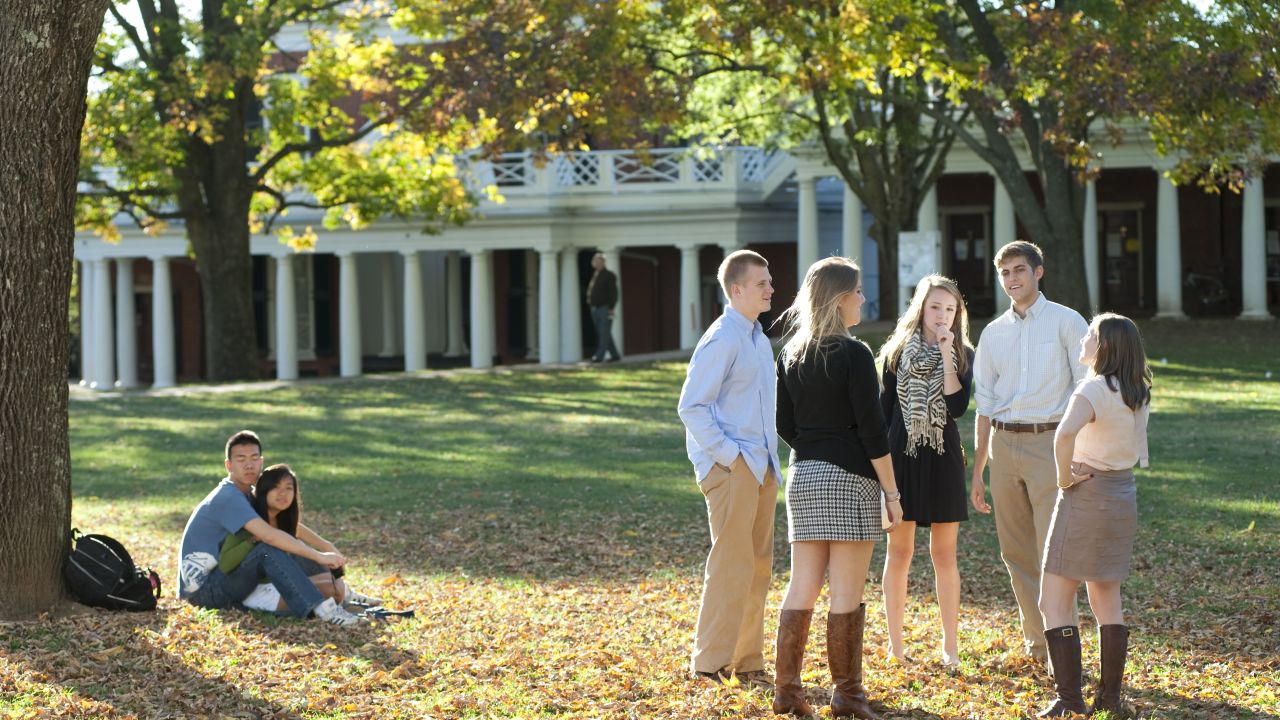
Public universities including the University of Virginia are the targets of a new demand that they should be treated as any corporate entity, judged exclusively on its bottom line. (Photo by Stephanie Gross/FTWP)
This post originally appeared at The Nation.
The conservative movement in the United States has long been wary of higher education. This is understandable given the fact that survey after survey demonstrates a positive correlation between education and progressive values. Conservatives tend to attribute this phenomenon to mass brainwashing by elite liberal professors coupled with a conspiracy to blacklist anyone who tells what they consider to be the truth. Indeed, educated hucksters like David Horowitz and Daniel Pipes have made a tidy fortune from their gullible funders by hawking exactly this silly idea: smearing academics with McCarthyite tactics as they simultaneously complain about the communities of competence that struggle to maintain the integrity of their disciplines.
In addition to these mini-crusades, right-wing foundations and funders have enjoyed considerable dividends from the program of long-term investments they made in private universities beginning in the 1970s, when a bunch of them decided that the entire edifice of public knowledge was titled against their worldview. More recently, however, the far-right has turned its attention away from these elite-oriented universities to public ones. Instead of seeking to change the minds — and hiring practices — of the Harvards and Stanfords of the world, they are now seeking to undermine the intellectual standards of state universities across America. They are doing this by persuading Republican-controlled state legislatures and governorships to pass massive cuts in funding while attacking the very foundations of higher education. The new demand is that public universities should be treated as any corporate entity, to be judged not as a social good but exclusively on its bottom line. (I should probably mention that I teach in a public university and that my daughter is beginning her freshman year at another this fall.)
The documentary Starving the Beast: The Battle to Disrupt and Reform America’s Public Universities, which opens this week, seeks to tell this story. It focuses on fights taking place at the University of Wisconsin, the University of Virginia, the University of North Carolina, Louisiana State University and the University of Texas and Texas A&M. You may be familiar with some of the details of these struggles, as each has enjoyed its share of national attention. What this film demonstrates is the degree to which all of them share similar roots. As UVA professor Siva Vaidhyanathan explains, Clayton Christensen, a professor at Harvard Business School, pioneered the notion of applying an ideology he termed “disruptive innovation” to public higher education. The concept was also embraced in Silicon Valley as “a parable that had tremendous narrative power,” “a religious sect,” and an idea that could be “applied to everything in American life.”
As applied to education, the doctrine treats students as consumers, not citizens. According to its most energetic apostle, Texas oilman and itinerant academic Jeff Sandefer, it demands that pretty much every topic taught in a university demonstrate its bottom-line value or be dropped. According to Sandefer, Shakespeare barely makes the cut, but Faulkner, not so much. “I’m not a big Faulkner fan,” he explains in the film.
Starving the Beast tracks the embrace of Sandefer’s ideas by the Texas Public Policy Foundation, a right-wing group that worked with Gov. Rick Perry and Republicans in the state legislature to try to “disrupt” the state’s two great institutions of higher learning: the University of Texas and Texas A&M. Mirabeau B. Lamar, president of the Republic of Texas from 1838 to 1841 and the man historians consider to be the “father of Texas education,” put forth the belief that “a cultivated mind is the guardian genius of American democracy.” Explicitly rejecting this belief, the Texas Public Policy Foundation sees no economic value in research universities, which have proven crucial to economic growth in regions of the country that lack the great private institutions that have traditionally educated the sons (and more recently the daughters) of the wealthy and powerful.
Now, some of these same wealthy and powerful are pressuring politicians — who, in turn, are pressuring college administrators and ultimately professors — to ensure that only the wealthy have access to a liberal education. That they are doing so at the same time that funds for these schools are being decimated, with tuition rising accordingly and student debt reaching crisis proportions, is no accident. Although some may believe that college ought to be a business, others appear to want a docile proletariat who will work for them, without unions or any hope of upward mobility. In February 2015, after demanding brutal budget cuts to the University of Wisconsin system and reducing tenure protections for its faculty, the Koch brothers’ plaything Gov. Scott Walker attempted to remove the inspirational words “search for truth” and “improve the human condition” from the university’s mission statement in exchange for a mandate to “meet the state’s workforce needs.” Does anyone really believe, as Walker pretends, that this was a mere “drafting error”?
The right-wing attack on the university dates back to a 1994 article by Bradley Foundation president Michael Joyce titled “The Legacy of the Wisconsin Idea: Hastening the Demise of an Exhausted Progressivism.” In the article, published in the Wisconsin Public Research Institute’s Wisconsin Interest magazine, Joyce complained that the school’s philosophy promoted “nothing less than the transfer of moral and spiritual authority away from civil society into the hands of the modern, centralized state.” He declared war on the state’s system of higher education as a means to “re-empower the traditional, local institutions,” working to “re-establish the dignity of traditional folk wisdom” and ultimately “hasten the demise of progressivism.”
Ironically, Starving the Beast is opening at the same time that the repressive government of Turkey’s Recep Tayyip Erdogan is exploiting the recent failed coup to wipe out all political and intellectual opposition, especially those writers, thinkers and teachers who support pluralism and multinational democracy. More than 5,000 academics have been arrested or detained so far. More than 4,000 have been fired from their jobs. Others have been warned not to participate in international scientific collaborations or conferences.
Of course, the United States is not Turkey and the threats our democracy faces are not really comparable. But the anti-democratic impulse at work in both places knows no boundaries, whether geographic, religious or ideological. If the right’s war on public higher education is allowed to succeed, America may confront its own version of this future. We can’t say we weren’t warned.
(Starving the Beast opens in New York City on Friday, September 9, and in several other US cities throughout the month of September.)




